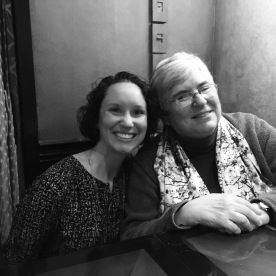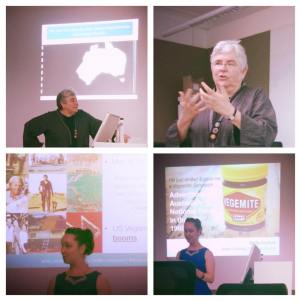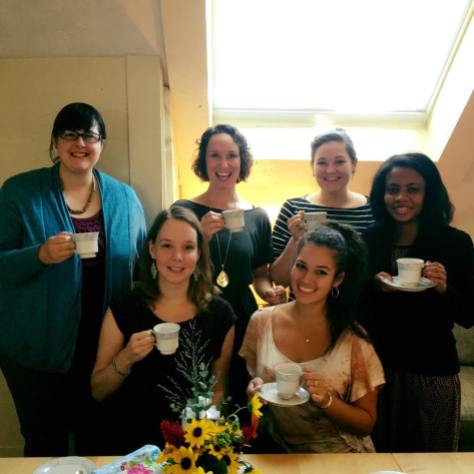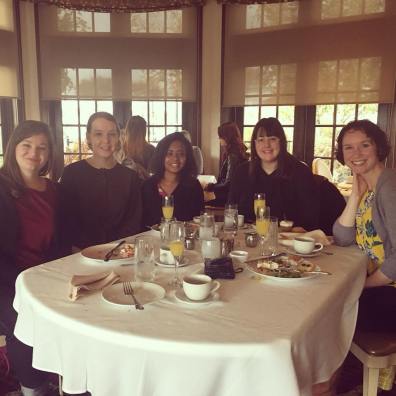Writing a dissertation can certainly be reduced to “an academic exercise,” but I was fortunate to experience it as a stimulating and satisfying intellectual process, thanks to the contributions of a great number of people.
To begin, I wrote an honors thesis at the University of Oklahoma on the language of the dieting industry as a way to make sense of myself and my world. And so my thanks begin with Julia Ehrhardt for her guidance of that first attempt to understand the intersections of food, bodies, and health in media like chain restaurant diet menus, women’s magazines, and diet books. I also thank her for her decade of support since then.
I returned to this project years later, while studying in the Boston University Gastronomy Program with Rachel Black. My thanks to her and to Warren Belasco and Carole Counihan—who Rachel rightly and fondly referred to as the grandfather and grandmother of food studies—for guiding my development into a food studies scholar. Warren and Carole served as the advisor and reader for my graduate thesis, which deepened my study of American diet culture and expanded it to focus specifically on masculinities. They remain unending sources of encouragement and advice. I am deeply grateful for them.
At Brown University, a supportive, responsive, and brilliant committee of American Studies faculty members guided my work from very early on during my time on campus. A trio of historians, they richly transformed my methodological approach for studying the present.

With Deborah Weinstein, I began my studies in the history of medicine and read a field in women’s history and gender and sexuality studies, which provided the theoretical framework for my dissertation. A beautifully consistent and critical reader of my work, she challenged me in all the right ways—and provided very useful advice on other topics as well, like wearing comfortable shoes during campus visits, the importance of which cannot be underestimated!
With Richard Meckel, I read a combined field addressing both food studies and the histories of medicine and public health, working to identify the points of connection between them. In addition to my research, he supported me as a teacher. Together we twice co-taught, “Food in American Society and Culture,” a most rewarding experience that would not have been possible without him.
With my dissertation director Susan Smulyan, I read a field in twentieth-century cultural history through the lens of consumption, popular culture, and media studies. Starting this reading birthed the expansion of my project from one focused on commercial diet programs and the representation of identity to one that addressed how the food, advertising, and media industries have constructed masculinities through food, cooking, and dieting in the twenty-first-century United States. Susan enthusiastically supported my ideas and her critical feedback guided the project at multiple key moments. Far beyond pushing my words on the page, she also facilitated my first foray into archival research and my first return trip to my birth country of Australia to present at a conference. She has helped to shape not only my scholarship, but also my life.
In addition to my committee, I thank Matthew Guterl, who championed my work and me from my first semester in the PhD program. I also thank Jeff Cabral, our department manager, whose aplomb and unfailing good humor fueled the logistics of my traveling to various conferences to present this research, processing teaching grants for my classes, and handling the financial details involved with the Food Studies at Brown Speaker Series.
I am also grateful for the members of the Association for the Study of Food and Society (ASFS). Sharing my research at the annual conference over the last six years—experiences always met with enthusiastic energy and thoughtful questions—affirmed my confidence at moments when I needed it. After I defended my dissertation, current ASFS President Krishnendu Ray referred to me as “a pillar for food studies.” I can only hope that my career lives up to such kind words.
I also thank the five endlessly talented and always kind women who make up my PhD cohort—Alyssa Anderson, Felicia Bevel, Kate Duffy, Suzanne Enzerink, and Diza Rule—who I made this journey with: reading, writing, reading more, writing more, tea parties, dinners, drinks, puppy sitting, and party hats all round, even if I sometimes refused to wear them on my head.
As silly as it may sound, I am also thankful for my dog Raven, a rescue pup who taught me much about trust, love, and resilience and who snuggled beside me as I typed every word of my manuscript.
I also thank my family: my sister, my father, and especially my mother, who has quite literally read every word I have ever written. She and I recently discussed how we are a family without a distinct ethnic entity, certainly not one to be observed or felt in our family food culture, something I’ve often pondered as a food scholar. She proposed that perhaps what my grandparents passed on to us was an identity centered on the open and joyful exchange of ideas, the pursuit of learning, and a genuine passion for creating and sharing knowledge. Watching over us from their final place of rest, they would delight—I think and hope—in me embarking upon a life in the academy.
Lastly, I thank my husband, who has been present for every step of my academic journey, from the moment we first locked eyes in a Latin translation course during my first weeks of college. He has moved across the country three separate times for me to complete the various stages of my graduate education. I recognize how lucky I am and how much he has given of himself and his career to support my dreams. I may never be able to thank him enough, but I will try, everyday, for the rest of our forever.
Abstract
The Dudification of Diet: Food Masculinities in Twenty-First-Century America examines how the food, advertising, and media industries have constructed masculinities through food in the twenty-first-century United States, particularly when attempting to create male consumers for products socially perceived as feminine. Employing the tools of critical discourse analysis to examine food, dieting, and cooking, I consider a diverse array of media texts—including advertising campaigns, marketing trade press, magazines, newspapers, industry reports, restaurants, menus, food criticism, blogs, and social media. Case studies include diet sodas (Coke Zero and Dr. Pepper Ten), yogurts (Oikos Triple Zero and Powerful Yogurt), weight loss programs (primarily Weight Watchers), and food television (namely Food Network star, Guy Fieri).
More than just companies jockeying for market share, these food phenomena “for men” marked a moment of heightened gender anxiety and the rise of a new gender discourse—dude masculinity. Partly created by the food marketing industry, dude masculinity sought to create socially acceptable routes into and through the feminized terrain of food and the body. As a gender discourse, it celebrates the “average guy,” while remaining complicit in hegemonic masculinity’s overall structure of social inequality.
Beyond gender performance, dude masculinity articulates apprehension for how consumption reconfigures notions of citizenship, bodily surveillance, and nationhood. Dude masculinity tells a larger story of the United States’ very recent past, one rooted in perceived social chaos, concerned with terrorism, border control, immigration, same-sex marriage, race relations, new media, and neoliberalism. Despite decades of resistance and progress toward gender equality, these recent social shifts have resulted in the reactionary shoring up of gendered categories, a complex and contradictory sociocultural process that I read through dude masculinity, food, and the body.
Previous scholarship has treated these areas of culture separately and considered food and gender largely in terms of femininity, domesticity, and care work. I synthesize feminist studies of media, food, and the body and apply them to masculinities, centering discussions of power. Bridging theory and practice, this dissertation also informs how entities like advertising campaigns, food packaging design, public health programs, and weight loss studies can rewrite gender scripts to promote equality and justice.























